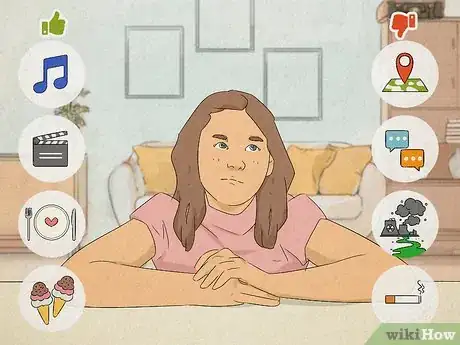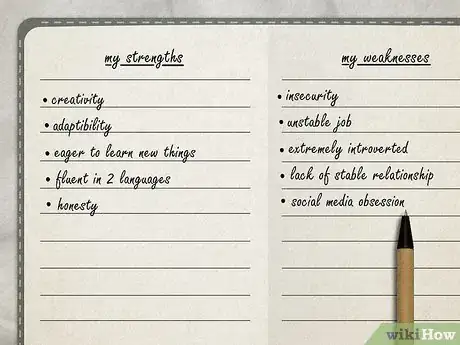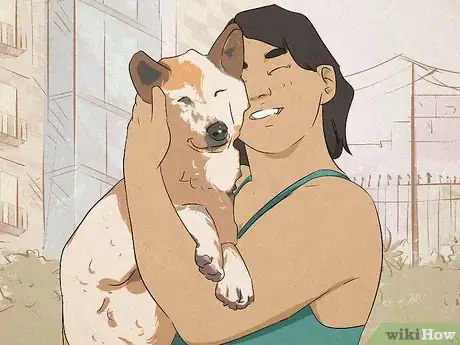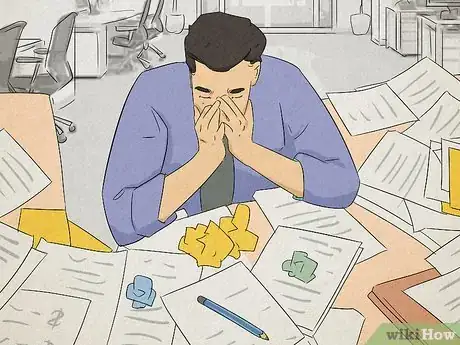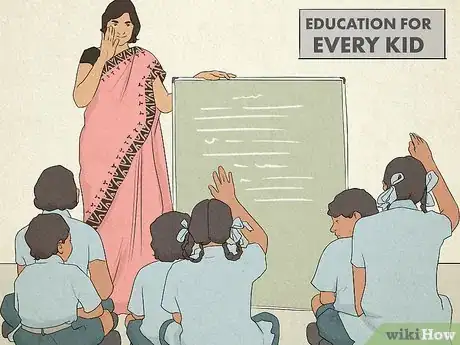This article was co-authored by Trudi Griffin, LPC, MS. Trudi Griffin is a Licensed Professional Counselor in Wisconsin specializing in Addictions and Mental Health. She provides therapy to people who struggle with addictions, mental health, and trauma in community health settings and private practice. She received her MS in Clinical Mental Health Counseling from Marquette University in 2011.
There are 7 references cited in this article, which can be found at the bottom of the page.
This article has been viewed 171,774 times.
One study suggests having a better ability to know yourself can help you make effective decisions and achieve goals.[1] Beyond the realm of science, the importance of knowing who you are is recognized by everyday people and pop culture icons, too. Beyoncé said, "Knowing who you are is the greatest wisdom a human being can possess. Know your goals, what you love, your morals, your needs, your standards, what you will not tolerate and what you are willing to die for. It defines who you are." Keep in mind, that as you grow older and are exposed to different people and experiences, who you are steadily evolves. If you are having trouble defining who you are, engage in self-reflection to uncover your truest self.
Steps
Taking a Closer Look at Yourself
-
1Figure out what you like and don't like. People often concentrate the hardest on what they like. While figuring out what brings you joy or pleasure is important, it is also helpful to know what causes you unhappiness or dissatisfaction. One of the first steps of self-reflection is sitting down and developing a list of all the things you like and all those you dislike.[2]
- Your likes and dislikes are often how you describe yourself to others. These are things that may separate us or relate us to those around us. Understanding these things helps you to know what you want to move toward in life and what you want to stay away from. Knowing your likes and dislikes can guide your career choices, where you live, your hobbies, and what kind of people you surround yourself with.
- Use this activity to see if your likes and dislikes are too rigid. Have you been placing yourself in a box? Is there something that you would like to do or try that is outside of what you think you should be on paper? Build up the courage to try something totally new. You might unveil a different side of yourself.
-
2Examine your strengths and challenges. Just as likes and dislikes can give you incredible insight into who you are, so can understanding the things you're good at and not-so-good at. On a separate piece of paper, create a list of strengths and challenges.
- For most people, strengths or talents may also overlap with their likes, and challenges may overlap with their dislikes. Let's say you like cupcakes, cookies, and pastries and a strength of yours is baking - the two are aligned. On the other hand, you might dislike sports and a challenge of yours is physical coordination or endurance.
- In many cases, the things that are challenges may become things you dislike because you are not naturally good at them. This tells the why of what you do or don't like.
- Simply knowing these things is meaningful in itself. However, you can dig deeper and decide if you want to work to improve on any of the things you find challenging, or if you want to focus your energy on things you are already good at.
Advertisement -
3Assess what brings you comfort. We can learn much about ourselves when we are at our best, but we can also glean significant understanding from when we are feeling low. Think hard about the last time(s) you were feeling down or stressed. What kind of comfort did you seek during this time? What made you feel better?
- Knowing what soothes you tells you a lot about yourself as a person. It could be that you always reach out to a certain person to lift you back up or take your mind off things. You might watch your favorite movies or escape into the pages of a favorite novel. The source of comfort for you could be food, which is common in people who eat emotionally.[3]
-
4Record your thoughts and emotions in a journal.[4] A great way to learn more about yourself is to become an observer of your thoughts and feelings. Do this for a week or more to get a bigger picture of the topics that constantly come to your mind or identify mood states that you frequently experience. Are your thoughts positive? Negative?[5]
- A review of your journal might reveal several subtle statements about a direction you'd like to take your life that you may not be consciously aware of. You might write over and over again about wanting to travel, about a certain person you like, or a new hobby you want to pick up.
- After finding reoccurring themes in your journal, take a moment to think about what these thoughts and feelings mean - and whether you want to act on them.
-
5Take a personality test. Another method to learn more about yourself is by completing a personality assessment online. Some people don't like being categorized, while, for some, placing labels on themselves and their behaviors brings order to life. If you are a person who enjoys understanding yourself by examining how you relate to (or differ from) others, taking a free online personality test might be helpful.
- Websites such as HumanMetrics.com require you to answer a series of questions about your preferences and how you view the world or yourself. The tool then analyzes your responses to provide you with a personality type that can help you understand which interests or occupations you might thrive in as well as how you communicate with those around you.
- Keep in mind that any free online assessment you take cannot be considered completely valid. These tests can offer you a general understanding of who you are. However, if you want an in-depth analysis of your personality, you will need to see a clinical psychologist.
Asking Yourself the Important Questions
-
1Probe deeper to learn your core values. Your values are basic standards you hold dear that influence your decisions, behaviors, and attitudes. These are beliefs or principles that you will stand for or fight for: family, equality, justice, peace, gratitude, dependability, fairness, financial stability, integrity, etc. If you don't know your core values, you can't verify whether you are making choices that align with them. You can discover your core values by:
- Thinking of two people you admire. What traits do you admire in these people?
- Thinking of a time when you felt really proud. What happened? Did you help someone? Achieve a goal? Stand up for your rights or those of someone else?
- Thinking about what issues you are most passionate about in your community or the world. These may include, but are not limited to government, the environment, education, feminism, crime, etc.
- Considering what three items you would save if your house were on fire (assuming all the living beings were already safe). Why would you save these three things?
-
2Question whether or not you are living a life you are proud of. As F. Scott Fitzgerald famously puts it, "I hope you live a life you're proud of. If you find you're not, I hope you have the strength to start all over again." If you were to pass away today, do you think you have left behind the legacy you hoped for?
-
3Ask yourself what you would love to do if money wasn't an issue. When we're children we often have lofty dreams for ourselves. As we get older, and more influenced by society, we alter those dreams. Go back to a time when you had an undeniable dream to do something, a dream you shut out because it wasn't the right time or your money wasn't sufficient. Write down how you would spend your day if you didn't have to consider your financial status. How would you live your life?
-
4Determine how your life would be if you weren't afraid of failing. We often miss out on amazing opportunities or don't take chances because we worry that we will fall flat on our faces. Self-doubt can define your whole life, if you don't work to overcome it. Sadly, it can also strongly impact the amount of "what if's" you have as you age. Here are a few ways to overcome your fear of failure, if you think it's holding you back from being the person you want to be:
- Know that failure is necessary. When we make mistakes, we are able to evaluate our actions and refine our methods. We grow and learn through failure.
- Visualize success. One way to brush off a fear of failure is to constantly imagine yourself accomplishing your goals.
- Stay persistent. Keep moving towards your goals despite setbacks. It is often that we achieve our wildest dreams right when we were about to give up. Don't let small failures cause you to lose sight of the bigger goal.
-
5Ask others their interpretations of you as a person. Once you have asked these other questions of yourself, reach out to a few people dear to you and ask them who they think you are. Their assessment can be a list of characteristics or an example of a specific moment that, in their opinion, summarized you as a person.
- After you have asked the opinions of several relatives or friends, ponder their answers. How did others describe you? Were you surprised by their assessments? Were you upset? Do these interpretations fit with the person you want to be or how you view yourself?
- If you value the opinions of these people, then you can ask yourself what you need to do to create more harmony with how they view you and how you view yourself. Maybe you have a skewed view of yourself and need to reevaluate your actions.
Examining How You Connect with Others
-
1Figure out if you are an introvert or extrovert. If you took an online personality assessment, one of the factors you may have been assessed on was introversion-extraversion. These are terms used by Carl Jung which describe where you get your energy from in life - either the internal or external world.[6]
- Introvert describes a person who gets energy from examining an inner world of thoughts, ideas, memories, and reactions. These people enjoy solitude and may prefer to spend time with one or two people with whom they share a connection. They may be reflective or reserved. Extrovert describes a person who gets energy from interacting in the external world. They enjoy being involved in a variety of activities and engaging with all sorts of people. They get excited when they are around others. They may take action before thinking a decision all the way through.
- Many popular interpretations describe introverts as being shy and withdrawn, while extroverts are said to be sociable and outgoing. These interpretations are faulty as most researchers have come to understand these traits as existing on a spectrum. No one is 100% introvert or extrovert, but rather leans on one or the other under certain circumstances.
-
2Decide what kind of friend you are. Knowing who you are also encompasses knowing your expectations, feelings, and actions relating to friendship. Reflect on your past friendships. Do you like to talk to your friends every day or every blue moon? Do you often organize get-togethers or are you just the person who gets invited? Do you value spending quality time with friends? Do you share intimate details about yourself with your friends or are you very guarded with what you share? Do you uplift/encourage your friends when they are feeling down? Do you drop everything for a friend in need? Do you place reasonable demands on friendships (i.e. don't expect your friends to always be available or only be friends with you)?
- Once you've asked yourself these question, decide if you are content with the kind of friend you are. If not, talk to your closest friends and see if they have advice on how you could be a better friend in the future.
-
3Evaluate those around you. It is said that you are the average of the five people closest to you. The idea is based on the law of averages: the outcome of a particular event will be based on the average of all possible outcomes. Relationships are not exempt from this rule. The people you spend the most time with strongly impact you - whether you want them to or not. Look closely at your closest relationships, because these people define who you are, too.[7]
- Of course, you are your own person, capable of making your own choices and forming your own conclusions. Still, those around you subtly impact your life in numerous ways. They may introduce you to new foods, fashion, books, and music. They may give you referrals for jobs. They may stay out late partying with you. They may cry on your shoulder after a break up.
- Can you see portions of yourself that were derived from those closest to you? Are you happy with what has rubbed off on you? Simply put, if you are surrounded by positive, hopeful people, you will feel and act similarly. If you are mostly around negative, toxic people, these attitudes may also cloud your life. If you want to know who you are, look around you for the answer.
-
4Think about the things you do when you're alone. What you do with others says a lot about you, but what you do on your own does, too. Oftentimes, we are heavily influenced by our social groups to think, act, and feel a certain way. When we are completely alone, however, we are closest to our truest selves - mostly untouched by society.
- When you are alone how do you spend your time? Are you unhappy when you are alone? Are you pleased? Do you read quietly? Do you play loud music and dance in the mirror? Do you fantasize about your wildest dreams?
- Think about these things and what they say about you.
Things You'll Need
- A notebook/journal and a pen
References
- ↑ https://www.jstor.org/stable/20152338?seq=1
- ↑ http://rwjms.umdnj.edu/departments_institutes/boggscenter/projects/documents/Chapter04-1.pdf
- ↑ https://psychcentral.com/blog/imperfect/2016/04/26-question-to-help-you-know-yourself-better#Why-do-we-experience-a-loss-of-identity?
- ↑ http://psychcentral.com/lib/the-health-benefits-of-journaling/
- ↑ http://www.takingcharge.csh.umn.edu/enhance-your-wellbeing/health/thoughts-emotions/how-do-thoughts-emotions-impact-health
- ↑ http://www.myersbriggs.org/my-mbti-personality-type/mbti-basics/extraversion-or-introversion.htm
- ↑ https://raisingchildren.net.au/pre-teens/behaviour/encouraging-good-behaviour/being-a-role-model
About This Article
To know who you are, start by taking an online personality test to get a general understanding of how you view yourself. Then, make specific lists, such as likes and dislikes or strengths and challenges, for a deeper understanding of yourself. Alternatively, ask yourself probing questions such as "Am I living a life I'm proud of?" or "What would I love to do if money wasn't an issue?" Along with self-examination, ask a few of your closest friends for their interpretation of you as a person. For more advice from our Mental Health reviewer, including how to work towards being a better version of yourself, keep reading.
